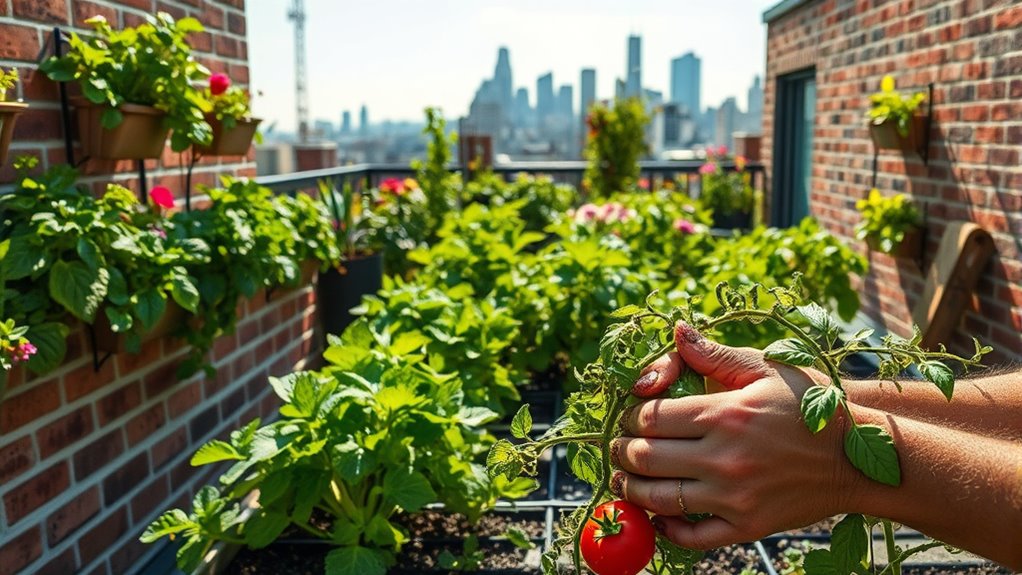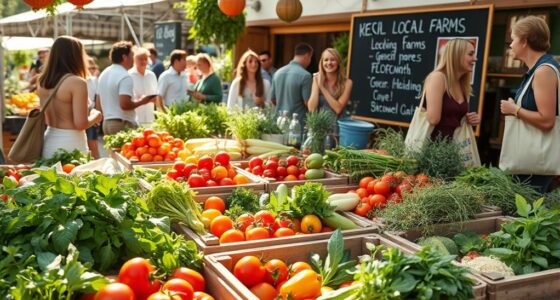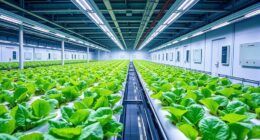Urban farming lets you grow your own food right in the city. By using rooftops, vacant lots, and innovative methods like hydroponics, you can enjoy fresh produce while improving your community. It reduces transportation emissions, boosts local economies, and enhances your health with easy access to nutritious options. Plus, it connects you with neighbors, fostering social bonds. You’ll discover more about how urban farming transforms urban landscapes and benefits everyone involved.
Key Takeaways
- Urban farming utilizes underutilized spaces in cities, such as rooftops and vacant lots, to grow food locally and sustainably.
- Methods like hydroponics and vertical farming maximize space efficiency, allowing for diverse crop production in urban environments.
- Community gardens foster collaboration, enhance social bonds, and improve mental health through gardening activities and shared responsibilities.
- Urban farms contribute to food security by providing fresh, pesticide-free produce directly to city residents, reducing reliance on distant food sources.
- These farms boost local economies by creating jobs, increasing property values, and fostering entrepreneurship through farmers’ markets and small businesses.
Definition and Practices of Urban Farming
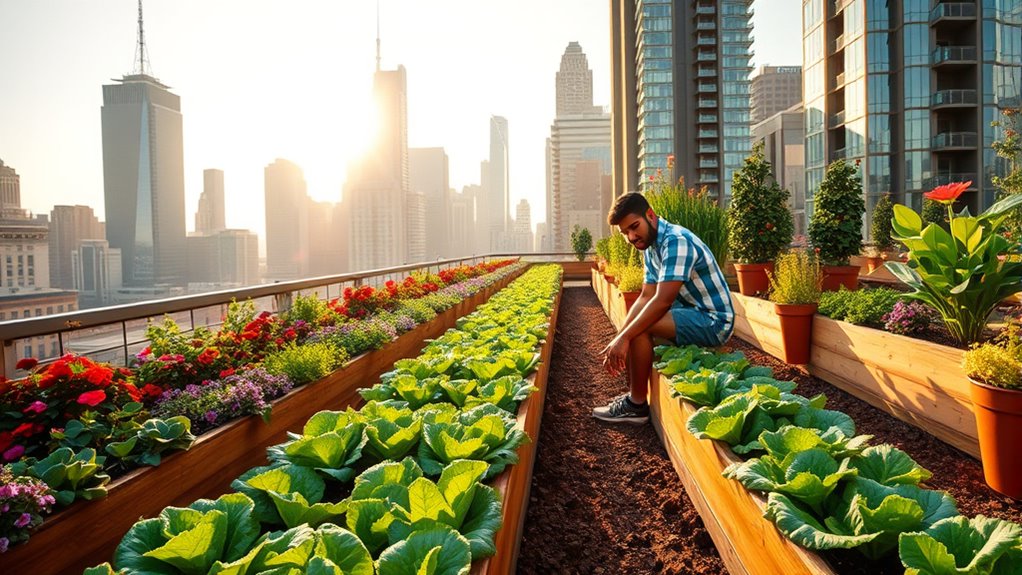
Urban farming, which involves growing food in city environments, is all about transforming underutilized spaces like rooftops and vacant lots into productive gardens. You can cultivate a variety of crops using methods like hydroponics, aquaponics, and vertical farming, maximizing limited space. Community gardens often serve as social hubs where neighbors come together to grow vegetables and share experiences, fostering emotional intelligence through collaborative efforts. Moreover, urban agriculture aims to improve food security by providing access to fresh produce in urban areas. Additionally, these initiatives can provide education on financial considerations for sustainable food practices. Establishing clear rules and routines in community gardening can enhance children’s well-being and encourage participation. Professional urban farms focus on market production, offering unique and specialty products. You might see repurposed buildings and raised beds enhancing city landscapes, while animal husbandry introduces chickens and bees into the mix.
Environmental Benefits of Urban Agriculture

Cities are increasingly recognizing the environmental benefits of urban agriculture. By growing food locally, you cut down on transportation emissions, greatly reducing greenhouse gases.
Urban farms also enhance biodiversity, providing habitats for pollinators and other wildlife. They help combat the urban heat island effect by adding more green spaces, which cools the environment. Urban farms can also promote biodiversity by serving as habitats for various species, further strengthening the ecosystem. Additionally, they can utilize backyard greenhouses to maximize growing space in limited urban areas. Implementing efficient water management practices, like rainwater harvesting, makes urban farming sustainable and conserves resources. Additionally, planting diverse crops improves carbon sequestration in urban soils, which can be further amplified by incorporating crop rotation techniques that enrich soil health.
Urban farms boost biodiversity and mitigate the heat island effect by creating essential green spaces that cool our cities.
While challenges like noise and water runoff exist, the overall environmental advantages make urban agriculture a critical component of sustainable city living, promoting community engagement and healthier ecosystems.
Economic Advantages of Urban Farming
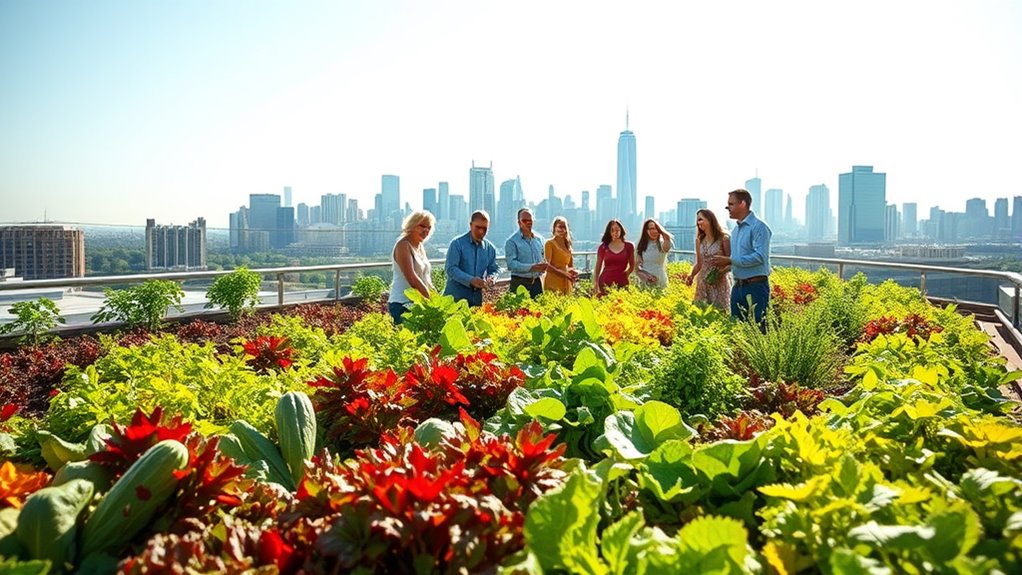
As urban agriculture continues to grow, it brings a host of economic advantages that can transform local communities.
You’ll notice rising property values as urban farms enhance neighborhood desirability, attracting businesses and residents alike. Repurposing unused land for farming creates profitable projects, which boosts local economic development. Urban agriculture stimulates economic development and tourism, increasing property desirability and value. Additionally, urban farms can provide fresh produce directly to city dwellers, reducing food deserts and improving access to nutritious options. Implementing self-care practices through community gardening initiatives can further promote well-being among residents. Furthermore, urban farming aligns with sustainability goals, encouraging environmentally friendly practices.
With farms close to consumers, transportation costs drop, ensuring fresher food. Urban agriculture fosters entrepreneurship, opening doors for small businesses and job opportunities, especially in disadvantaged areas.
You’ll see community involvement strengthen neighborhood pride and cohesion, leading to further investment and improvements. Plus, direct sales at farmers’ markets engage consumers, enhance local economic activity, and cater to the increasing demand for sustainable, locally sourced produce.
Health and Nutrition Impact
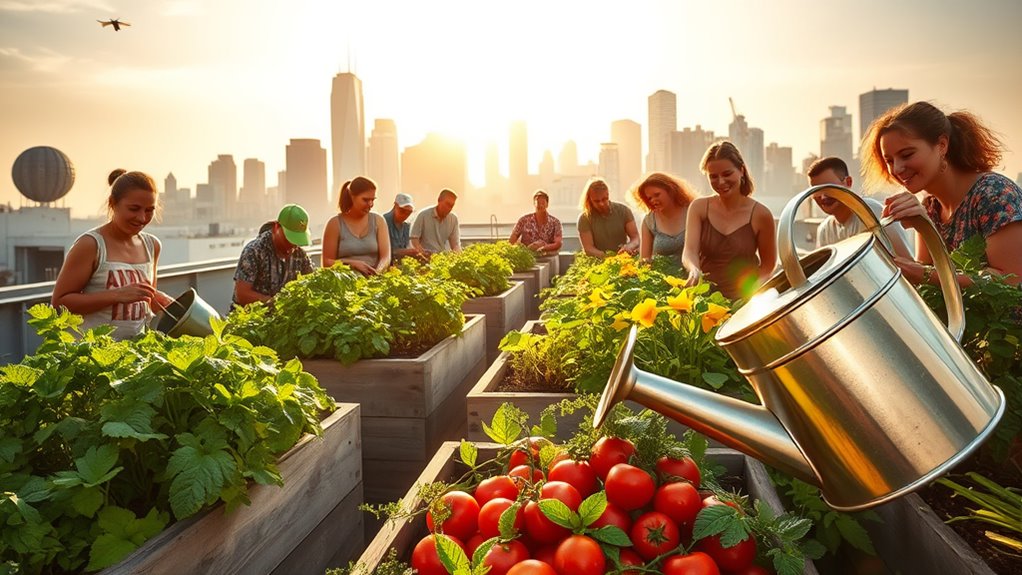
The rise of urban farming not only boosts local economies but also considerably enhances health and nutrition within communities.
By engaging in urban farming, you increase your physical activity through tasks like planting and harvesting, improving your overall fitness. Plus, being connected to nature helps reduce stress and anxiety, promoting better mental health. Additionally, creating a retirement savings plan can provide financial stability, allowing individuals to invest more in their health and wellness. Urban farming can help prevent running dry, ensuring individuals maintain their energy levels and overall vitality. Furthermore, incorporating protein-rich foods such as eggs from urban gardens can significantly enhance your breakfast options and overall nutrition.
Access to fresh, locally grown fruits and vegetables enriches your diet and improves food security in areas lacking nutritious options. You’ll enjoy pesticide-free produce, enhancing your well-being. Furthermore, urban agriculture promotes environmental sustainability, which contributes to healthier living conditions.
Additionally, participating in community gardens fosters social interaction, combating feelings of isolation.
Ultimately, urban farming leads to better self-reported health levels, making it an essential component of urban living for both body and mind.
Social and Community Contributions

While many might think of urban farming solely as a means to grow food, it also plays a pivotal role in building social connections and fostering community spirit.
Community gardens and urban farms create collaborative spaces where diverse groups come together, sharing knowledge and resources. These projects cultivate social bonds, especially among marginalized groups, enhancing inclusivity. Urban farming initiatives often involve local food systems, which further strengthen community ties by connecting residents directly with the source of their food. Additionally, advance directives can guide families in planning for future needs, reinforcing the importance of community support in various aspects of life. Creating accessible gardening spaces also aligns with transforming spaces that enhance the quality of life for seniors, ensuring everyone can participate in these beneficial activities.
By transforming vacant lots into productive green spaces, you help improve neighborhood aesthetics and safety.
Urban farming also provides educational opportunities through workshops and school programs, equipping you with skills in sustainable food production. This not only empowers individuals to grow their own food but also strengthens community engagement, promoting a sense of shared responsibility and purpose in your neighborhood.
Frequently Asked Questions
What Types of Crops Can Be Grown in Urban Farms?
You can grow a variety of crops in urban farms, including leafy greens like lettuce and kale, which thrive in small spaces.
Herbs such as basil and mint are easy to cultivate and popular among city dwellers.
Consider microgreens for their quick growth and compact size.
If you have more room, cherry tomatoes and compact carrots can also flourish.
These options not only maximize your space but also cater to local food demands.
How Can Individuals Start Their Own Urban Farm?
To start your own urban farm, you’ll need to define your mission and goals, ensuring they align with community needs.
Secure a suitable location, check zoning regulations, and assess soil and water access.
Engage with local stakeholders to build support, and gather resources through workshops.
Create a budget to cover startup costs and choose crops that thrive in your area.
Focus on sustainability and community involvement to enhance your farm’s impact.
What Are the Challenges of Urban Farming?
Did you know that 80% of the world’s population is expected to live in urban areas by 2050?
Urban farming faces several challenges, like limited land availability and high costs. You’ll need to get creative with space, possibly utilizing vertical gardens or repurposing unused areas.
Additionally, regulatory hurdles, such as zoning laws and food safety regulations, can complicate your efforts. Addressing these obstacles is key to successfully cultivating food in urban environments.
Are There Regulations for Urban Farming in Cities?
Yes, there are regulations for urban farming in cities, and you’ll need to navigate them carefully.
Zoning laws dictate how land can be used, affecting what you can grow or raise. You might need permits for building structures, installing irrigation, or selling produce.
Compliance with health and safety standards is essential, too, ensuring your operations meet local guidelines.
Research your city’s specific regulations to avoid any legal issues as you start your urban farming journey.
How Can Urban Farms Combat Food Insecurity?
Urban farms directly combat food insecurity by providing fresh produce to communities lacking access to nutritious food. They can grow crops in vacant lots or rooftops, making fresh vegetables and fruits more affordable.
Conclusion
Urban farming isn’t just a trend; it’s a movement that connects you to your food, community, and environment. As you dig in the soil, you might just discover a new passion for gardening or meet a neighbor who shares your love for fresh produce. By embracing this practice, you’re not only nurturing your health but also contributing to a sustainable future. So why not grab a seed packet and start your own urban garden? You never know what might grow!
